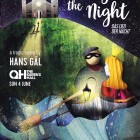Lied der Nacht 2017Hans Gál Society
Read more about the opera Song of the Night
Rousing reception for revival of unknown work
Song of the Night is the third of Hans Gál's four operas, first produced in 1926 but eventually stifled by the Nazis. Given that the composer was a highly respected resident of Edinburgh for nearly half a century, it seems shocking that none of them has been performed in Scotland up to now. It is to be hoped that the exploration of these works will not stop here. Certainly the enthusiastic audience reaction indicated strongly that some scope for development exists.
It is difficult to imagine a better attempt being made to bring an unknown work to our attention. Proceedings began with a lucid and enlightening introduction by the composer's daughter, Eva Fox-Gál. A good-sized orchestra filled much of the floor area of the Queen's Hall and took advantage of a warm acoustic to project what turned out to be a rather luscious late-romantic score, beautifully orchestrated. The performance was described as 'concert-staged' which indicates a certain amount of acting, even without costumes or settings. In the event the choristers stood in rows and sang their difficult music from the score. The soloists were supplied with music stands, but the moodily effective lighting made them unobtrusive. It often seemed as though the singers were inside their parts to the point where scores were almost unnecessary.
Historical context
The influences at work in the piece are fascinating. The location in mediaeval Sicily brings to mind Szymanowski and his gloriously exotic opera King Roger, where the siren-song of a tenor (a shepherd-god rather than a boatman) is also key. And the Polish composer's Third Symphony has a title 'The Song of the Night'. Still these pieces are not obvious musical influences on Gál. Wagner certainly is - the nameless hero who is lost when his identity becomes known is reminiscent of Lohengrin, as are the fanfares when the crowd assembles in the last act. And the first act encounter between the Princess and her aunt, the Abbess, could also be an imaginary meeting between Brünnhilde and her mother, Erda. The influence of Strauss and Mahler could also be heard in a few bars. Early in the last act there was a melancholy, distinctly Straussian, quartet for the two sopranos with baritone and bass - very unusual sonorities.
Most importantly, several composers have come to attention in recent years through their position in the honoured ranks of 'Entartete Musik' - compositions by living composers that were banned by the Nazis. From Braunfels to Zemlinsky by way of Korngold, Kraša, Křenek, Schreker, Schulhoff, Weill - even operetta was not immune, with Emmerich Kálmán's lovely pieces forbidden. Music by all of these has been brought back in our time - so why has Gál escaped thus far the scrutiny given to others? No matter, if we are now to hear more of it. The lush melodies could certainly be compared without disadvantage to works by Korngold and Zemlinsky.
Thoroughly enjoyable
All the above points perhaps indicate, rightly, that Song of the Night is not a faultless masterpiece. However there is lots of excellent writing in it, and the whole experience was thoroughly enjoyable. Perhaps the second act was best of all. It began with a prelude - throbbing strings and harp with beautifully intertwined oboe and cor anglais that could surely survive as a concert piece. The writing for the two sopranos was beautifully contrasted. The big duet for Princess and 'Phantom' was astonishing. It starts as a couple of solos, the Singer delivering his ballads off-stage, the Princess admiring them. Gradually the voices unite until interrupted by the attempted rape and the off-stage fight, described by the Princess and a powerful orchestral flurry as she watches. Only then does the Singer arrive on stage and the 'duet proper' resumes. It is all beautifully written for the voices, and was given a stirring performance by Janet de Vigne and Luke Sinclair, backed up by a superb orchestra.
The conductor Robert Dick has developed an excellent record of directing large-scale amateur and semi-professional forces both in Edinburgh and Dundee in recent years, showing an adventurous choice of orchestral repertoire. Even by those standards this was going out on a limb, but the results were entirely successful. His pacing of the scenes seemed ideal and there was some beautiful phrasing from every section of the orchestra.
The singers are generally becoming familiar names too. Soprano Janet de Vigne has built a useful reputation locally as a soprano able to cope with the heavier end of the lyric spectrum. Her acting experience also helps her project a character with tact. Tenor Luke Sinclair trained recently in Glasgow and has a career that is steadily developing. The voice has a lovely warm tone while still developing in power, and he is also a sensitive actor. He is off on contract to Lyon in the autumn, so we may not hear him again for a while.
Soprano Emma Morwood, has a lovely bell-like lyric soprano, and much of her music exploited it to the full. Gál certainly knew how to write for the voice. Mezzo Judy Brown had a long and vital scene in the first act - the writing influenced by Erda in the Ring and none the worse for that. She performed beautifully, and also projected with excellent diction. Baritone Mark Saberton and bass Marcin Gesla had rather less to do, but were still highly effective.
Performance Cast
- Hämone the Princess's companion and confidante
- Chancellor Imperial Administrator
- Tancred a Knight, Lianora's cousin
- Lianora Crown Princess of Sicily
- Abbess known as the 'Stony Abbess', Lianora's aunt
- Ciullo a boatman - the Nameless Singer
- Galwine
- Solo Voice

